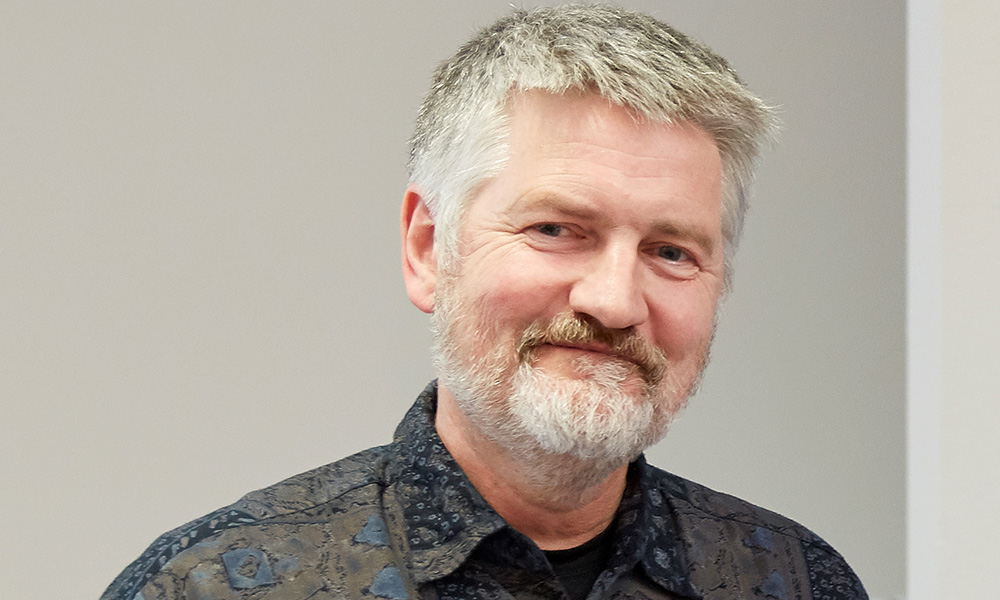
Supporting EMBL and fundamental research
EMBL alumnus Angus Lamond explains the value of fundamental research and how it can be translated into wider impact

Interview by Marius Bruer, additional text by Tom Furnival-Adams, Alumni Relations Officer
Angus Lamond, a former Group Leader and Senior Scientist at EMBL Heidelberg, is an example of how EMBL alumni help to galvanise the community through their passion for EMBL and the life sciences. Angus, now a Professor at the University of Dundee, has been involved in the EMBL Alumni Association from the beginning. He was its first Chair, from 2002–2008, and he has supported various initiatives and events through the years.
Following the first lockdowns of the COVID-19 pandemic in March 2020, Angus and EMBL’s Alumni Relations team identified the need for a virtual alumni forum to help the community stay connected. As a result, they launched ‘Coffee with EMBL’: a series of events that bring the community together with special guest speakers and scientists for open, topical debate, with Angus moderating the discussions. In April, ‘Coffee with EMBL’ celebrated its first anniversary, highlighting its longevity and success. The Alumni Relations team would like to thank Angus for his tireless efforts in supporting the events as an instigator, contributor, and host.
In early 2020, Angus was co-organising an ‘EMBL in the UK’ event in Dundee, which would focus on how research discoveries can be effectively translated into impact. Following a postponement due to the COVID-19 pandemic, the event is now due to take place in 2022. Here, Angus reflects on the process of translating research discoveries, and discusses the importance of fundamental research – to EMBL and wider society.
I will always be a passionate defender of the need for fundamental research. Companies, technologies, wealth, new healthcare products, and so forth came from people doing high-quality fundamental research. I think we must continue to make the argument that this kind of research, with excellence as its main motivation, must be supported. The idea of only funding what is perceived as applied research is a massive mistake, because our understanding about what types of knowledge and research can most usefully be applied is changing and evolving over time as new discoveries are made.
We need to have an intelligent, broad-based dialogue between leaders of academic research and those funding research, because we should all be on the same side. This dialogue would allow us to come up with a more productive strategy, with a continued focus on excellence. This would involve not only funding basic research, but broadening its impact – breaking barriers and strengthening opportunities for new start-up companies to form. It’s only by stimulating a culture that makes it relatively easy to start new companies that the success stories of the future will come through.
In my experience of starting spin-out companies and seeking venture investment, the funding process is very different from academic grant writing. It’s common for academic researchers to focus almost exclusively on issues around technology, problem solving, and product development, because that’s what they know best and are most interested in. However, you need to understand what the people on the other side of the table are thinking if you’re asking them for investment, because they’re usually approaching the proposition from a different perspective. The more mutual understanding there is, and the less suspicion, the more productive the discussions will be, and the higher the chances of a successful outcome.
There are a lot of lessons from my own experience that may be useful to other academics considering launching a new spin-out. For example, it’s important to move from thinking only about your research and new technology to also understanding the needs of your future customers. How do you deal with customer experience and marketing your product? You also need to understand accounting and cashflow. Most start-ups fail because of cashflow, not because of fundamental problems with the technology or even the potential market value of new products. I think we need to build an environment in the community where there’s more connection between people with these complementary skills, so that when new start-up companies are launched, they include the combination of talents and expertise that’s really needed to be successful.
Don’t strangle a small seed before it can grow into a large fruit-producing tree. We need to keep explaining to the funders the potential benefits of the investments we’re asking them to make in fundamental research. At the same time, we as researchers also need to listen to society and reflect on what’s needed from us in return. I think society can benefit greatly from a flourishing fundamental research environment, especially one that encourages researchers to innovate, tackle difficult problems, and take risks. Fear of failure and losing funding encourage researchers to play safe, leading to only incremental advances. EMBL can showcase the value of a thriving, ambitious research culture that addresses the major challenges of our age and inspires and enables the research leaders of the future.


